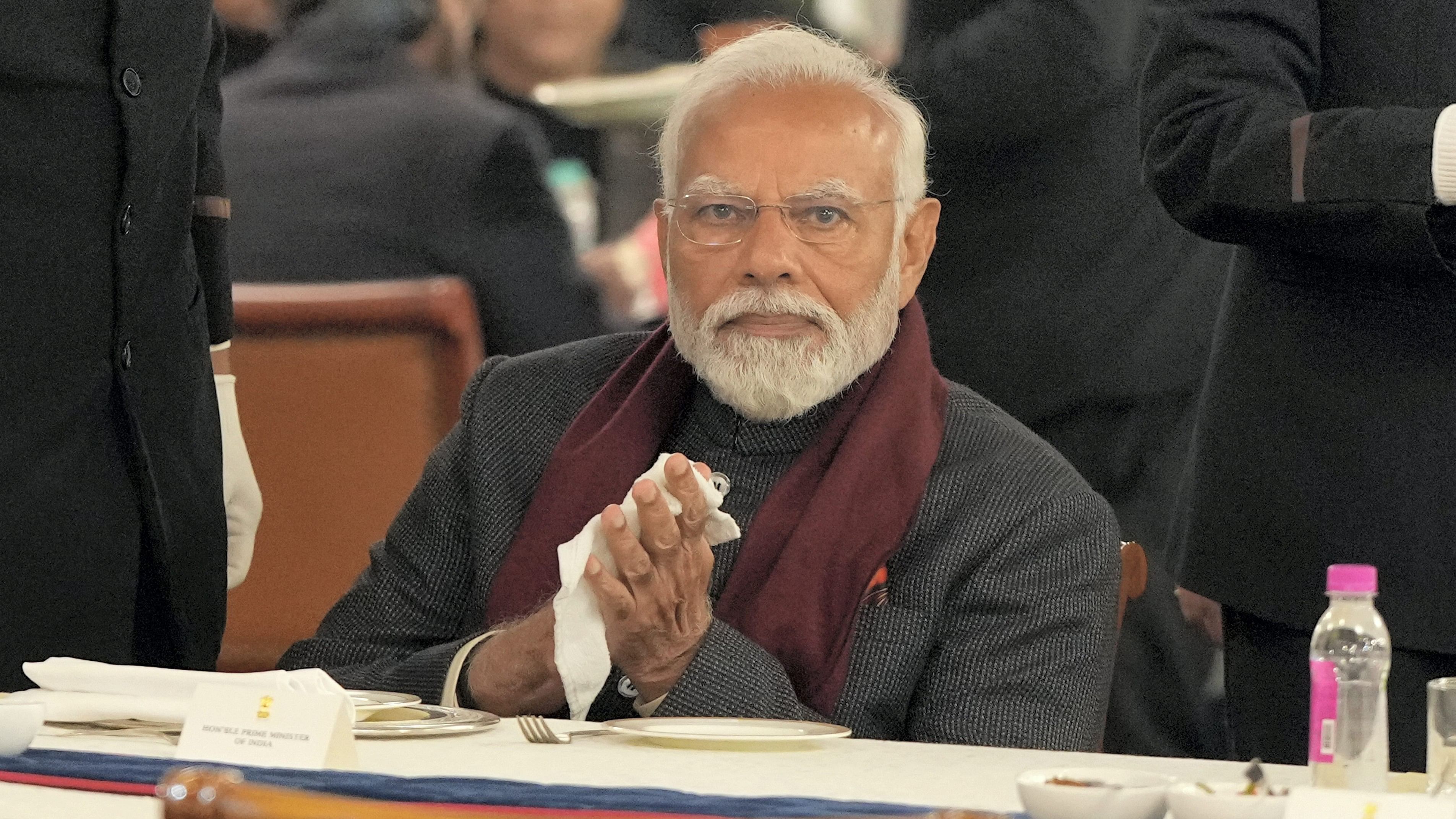
Prime Minister Narendra Modi during a farewell function in honour of retiring Members of Rajya Sabha, in New Delhi, on Thursday.
Credit: PTI Photo
New Delhi: State awards often convey a message beyond the public contributions made by their recipients and the Modi government's pick of five of them, with three of four politicians in the list firmly belonging to the non-BJP sphere, for Bharat Ratna in this year of national elections is no exception.
Prime Minister Narendra Modi has sought to send out the message that the ruling BJP, unlike its predecessors at the helm, is not guided by parochial politics in recognising contributions in the public life, as the party looks to break new ground during the polls.
Former Prime Minister Charan Singh and ex-Bihar Chief Minister Karpoori Thakoor were ideological fellow travellers despite political differences and championed an ideology and constituencies which were not a familiar territory for the BJP for decades before Modi after taking the helm in 2014 successfully connected with them substantially.
Former Prime Minister P V Narasimha Rao was a lifelong Congressman and is considered the political architect of economic reforms which changed the country's course.
However, Rao's own party's "shabby" treatment of him and his legacy after he lost power in 1996, as often highlighted by the BJP which blames the Gandhi family, has made him a figure of sympathy and even respect in pro-BJP circles for his contributions.
That he was a Telugu and the only south Indian prime minister to have served a full term will give the BJP a fresh plank to make fresh inroads in Andhra Pradesh and Telangana.
Charan Singh, who quit the Congress in 1967 and ended its hegemony in Uttar Pradesh by becoming its first non-Congress chief minister the same year, mobilised agrarian communities in north India, paving the way for the rise of parties wedded to social justice and anti-Congressism for many years.
A passionate proponent of farmers' interest, his appeal cut across regions and castes as he rallied farmers, a community which has had several run-ins with the Modi government over a variety of issues in parts of north India.
Singh remains a revered figure among Jats, a caste which has not been a keen supporter of the BJP in the states of their influence like Uttar Pradesh and especially in Rajasthan and Haryana.
The BJP is also in alliance talks with opposition INDIA bloc member Rashtriya Lok Dal, which is led by Singh's grandson Jayant Singh.
The Rajya Sabha member reacted with delight to the Bharat Ratna announcement, saying 'dil jeet liya' (won the heart).
Incidentally, it was Charan Singh who had brought down India's first non-Congress government headed by Morarji Desai over the "dual membership" issue, a reference to those leaders of Janata Singh who were in the Jana Sangh and continued to maintain ties with the RSS.
He even briefly joined hands with the Congress to become prime minister but lost power quickly as the promised support from the party's leader Indira Gandhi never came.
A BJP leader said the choices of Singh and agricultural scientist M S Swaminathan, the only non-politician among the five Bharat Ratna awardees this year, exemplify the Modi government's commitment to the agricultural sector, as both have significantly championed its cause.
That Rao and Swaminathan hail from south India show that the Modi government values the contribution and expertise from all corners of the country, he added.
In the coming days, the BJP will be highlighting the difference in the approach of the Modi government and previous Congress governments in bestowing the national awards as it has often accused the opposition party of using political prism to select them.
Modi has often noted that Jawaharlal Nehru and Indira Gandhi were given Bharat Ratna when they were prime minister while likes of B R Ambedkar and Sardar Patel were recognised decades after their death.
Among the latest awardees, Swaminathan is also a popular figure among farmers as much for pioneering the green revolution as for authoring a report which has made recommendations to boost their income.
A stalwart backward leader, Thakur is especially remembered for recognising the need for ensuring separate reservation for the Extremely Backward Classes, a pioneering concept in the 70s.
Bihar Chief Minister Nitish Kumar, who considers himself Thakur's followers, joined the NDA days after he was named for the Bharat Ratna honour.
Veteran BJP leader Lal Krishna Advani (96) is the only surviving member among the five recipients of the honour.
The Bharat Ratna for him has been seen as the ruling dispensation's recognition of a leader who was pivotal to the rise of the BJP and the spread of its ideology despite his differences with the party leadership over the elevation of Modi as its prime ministerial candidate in 2013.
While Singh passed away in 1987 and Thakur a year later, Rao died in 2004 while Swaminathan breathed his last in 2023.